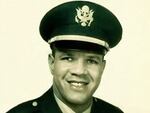
Retired Col. Paris Davis will be awarded the Medal of Honor on Friday for risking his life multiple times to save his men during an ambush in Vietnam.
U.S. Army Fort Benning and The Maneuver Center of Excellence
President Biden will award retired Army Special Forces Col. Paris Davis the Medal of Honor for risking his life multiple times to save his men during a fierce ambush in Vietnam nearly 60 years ago.
The president called Davis earlier this month to notify the former colonel of his award, the nation's highest military award for valor. Biden will award Davis the Medal of Honor at a ceremony Friday at 11:30 a.m. ET.
Davis, one of the first Black Special Forces officers, said in a statement that Biden's call "prompted a wave of memories of the men and women I served with in Vietnam – from the members of 5th Special Forces Group and other U.S. military units to the doctors and nurses who cared for our wounded."
The Medal of Honor is awarded to any military servicemember who "distinguishes himself conspicuously by gallantry and intrepidity at the risk of his life above and beyond the call of duty," according to the Congressional Medal of Honor Society.
Davis and his men were in a fight for their lives
Of the more than 41 million men and women who served in America's military, 3,515 have been awarded the Medal of Honor — 18.5% of them honored posthumously. Davis nearly joined the latter group while serving in Vietnam.
The sun had only just begun to rise on June 18, 1965, when Davis and the three Green Berets under his command were pinned down by relentless enemy fire. The group had led a company of South Vietnamese soldiers on a raid against a Viet Cong headquarters hours before and were ambushed on their way back to base, Davis recounted.
With many of his men dead or wounded, Davis, a young captain at the time, repeatedly beat back enemy forces using everything and anything at his disposal; mortars, machine guns, grenades, the buttstock of his rifle and even hand-to-hand combat, he recalled.
The situation deteriorated as the morning became the afternoon.
Davis called for artillery fire support despite being what's known as "danger close" to the target, with rounds landing within 100 feet of his own position. The fire mission gave him an opportunity to reach one of his wounded men, though Davis had been shot at least once and been wounded by a grenade by this point.
But the enemy continued their assault, and Davis was ordered by an Air Force colonel to pull out with whatever men he could save. In an interview on the Phil Donahue Show in 1969, Davis said there were as many as 700 enemy combatants trying to overrun his position.
Davis refused to leave when ordered to retreat
Davis had managed to save two of his men who had been wounded in a rice paddy, he recalled. But one man was still unaccounted for, and Davis refused to leave him behind.
"Sir, I'm just not going to leave. I still have an American out there," Davis recalled telling the colonel in the Phil Donohue Show interview.
Davis called for a medical evacuation to transport his wounded men out of the area and was shot in the leg while carrying one of the Green Berets to the chopper.
Late in the afternoon, Davis was able to locate his missing man and get him to safety. Davis could tell the Green Beret was gravely wounded, but was unsure to what extent. He had spent more than 12 hours bleeding out in the rice paddy before Davis reached him.
Reinforcements eventually arrived, allowing Davis, the three Americans and the surviving South Vietnamese soldiers to escape to safety.
For his unwavering courage and leadership in the face of near-certain death, Davis was awarded the Silver Star and the Purple Heart.
But Davis's paperwork for the Medal of Honor was "inexplicably lost on multiple occasions," according to the Virginia Senate resolution backing his commendation. America was in the middle of the civil rights movement at the time, and Davis told CBS News in 2021 that race was a factor his paperwork disappearing.
After retiring from the Army in July of 1985 Davis started a newspaper in Virginia. He was admitted into the Ranger Hall of Fame in 2019.
Copyright 2023 NPR. To see more, visit https://www.npr.org.